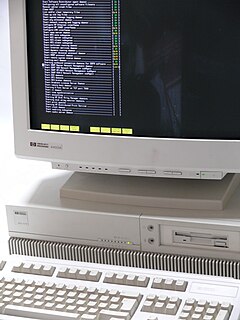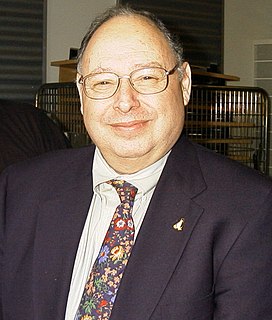Unix International (UI) was an association created in 1988 to promote open standards, especially the Unix operating system. Its most notable members were AT&T and Sun Microsystems, and in fact the commonly accepted reason for its existence was as a counterbalance to the Open Software Foundation (OSF), itself created in response to AT&T's and Sun's Unix partnership of that time. UI and OSF thus represented the two sides of the Unix wars in the late 1980s and early 1990s.

Unix is a family of multitasking, multiuser computer operating systems that derive from the original AT&T Unix, development starting in the 1970s at the Bell Labs research center by Ken Thompson, Dennis Ritchie, and others.

An operating system (OS) is system software that manages computer hardware and software resources and provides common services for computer programs.

AT&T Inc. is an American multinational conglomerate holding company headquartered at Whitacre Tower in Downtown Dallas, Texas. It is the world's largest telecommunications company, the second largest provider of mobile telephone services, and the largest provider of fixed telephone services in the United States through AT&T Communications. Since June 14, 2018, it is also the parent company of mass media conglomerate WarnerMedia, making it the world's largest media and entertainment company in terms of revenue. As of 2018, AT&T is ranked #9 on the Fortune 500 rankings of the largest United States corporations by total revenue.
In May 1993, the major members of both UI and OSF announced the Common Open Software Environment (COSE) initiative. This was followed by the merging of UI and OSF into a "new OSF" in March 1994, which in turn merged with X/Open in 1996, forming The Open Group.

The Common Open Software Environment (COSE) was an initiative formed in March 1993 by the major Unix vendors of the time to create open, unified operating system (OS) standards.
X/Open Company, Ltd., originally the Open Group for Unix Systems, was a consortium founded by several European UNIX systems manufacturers in 1984 to identify and promote open standards in the field of information technology. More specifically, the original aim was to define a single specification for operating systems derived from UNIX, to increase the interoperability of applications and reduce the cost of porting software. Its original members were Bull, ICL, Siemens, Olivetti, and Nixdorf—a group sometimes referred to as BISON. Philips and Ericsson joined soon afterwards, at which point the name X/Open was adopted.
The Open Group is an industry consortium that seeks to "enable the achievement of business objectives" by developing "open, vendor-neutral technology standards and certifications". It has over 625 members and provides a number of services, including strategy, management, innovation and research, standards, certification, and test development. It was established in 1996 when X/Open merged with the Open Software Foundation.






